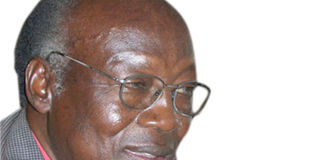Amuru land saga: Let minister Amongi carry her own cross

Livingstone Okello-Okello
Since I wrote to Ms Betty Amongi, minister of Lands, Housing and Urban Development about two weeks ago, she replied to me through Whatsapp saying I should have sought clarification from her before writing the letter. With all due respect to the minister, I am old enough to know under what circumstances clarification should be sought. In this particular instance, there was no need.
In the last two weeks, things have gone from bad to worse in Amuru. On August 10, the people of Amuru were tear-gassed, some were injured while others were arrested, including MP Odonga Otto; women stripped in front of the minister, who seeing the situation, never got out of her car; and so on. The minister has been camping in Gulu determined to go back to Amuru to survey the land and subsequently deliver land titles to who God knows.
On August 11, I watched on the TV news two press conferences - both took place in Gulu. The first one was by some Acholi MPs and the second one was by minister Amongi. The press conferences were convened to inform the people of Acholi and the country at large what had taken place in Amuru the previous day.
I would like to sincerely thank those few MPs from Acholi who have stood with the people of Amuru at their time of need. However, I beg them to have a very clear understanding of the Amuru land saga. Some of the statements which came out of their press conference were uncalled for and unnecessary. Ms Amongi is not sent to Amuru by the people of Lango. Never ever attribute what she is doing to the people of Lango. The people of Lango are equally concerned about what she is doing like we in Acholi are. If you take the route which will divide the people of Acholi and Lango, you will play right into the hands of those who are hell-bent on dividing us. Ms Amongi must carry her own cross. Similarly, it was not right to mention the name of Dr Milton Obote in connection with the Amuru land issue. Let the father of the nation rest in peace. He was an exemplary president, a genuine one who worked tirelessly for the unity and development of this country.
The minister at her press conference raised a number of issues. She said the litigants in the Amuru land case lost in the “Magistrate’s Court”, she talked about “public land”, she trivialised women stripping as mere “drama”, which cannot stop government work, etc. The minister is apparently pursuing a matter on which she has not been properly briefed. Amuru land case was never filed in the Magistrate’s Court. It was above that level, in the High Court. The majority of land in Uganda became public land in 1962 and remained so until 1995. It was governed by the Public Land Act, 1969, which was rendered irrelevant when the 1995 Constitution vested the land in the citizens of Uganda. It was repealed by the Land Act 1998 (Cap.227). Currently, there are only four land tenure systems in Uganda as provided for in the Constitution and in the Land Act, 1998. They are: (a) customary; (b) freehold; (c) mailo; and (d) leasehold. There is no any other land tenure system. Nobody should, therefore, confuse the public by talking about non-existent public land. Trivialising stripping by women as a mere “drama” can only be an act of extreme arrogance. This is a cultural and traditional practice in some communities, Acholi inclusive, of expressing the highest degree of sadness or annoyance.
I worked in the Land ministry for about 28 years, rising from the level of government valuer to chief government valuer to Commissioner of Lands. In those days, every department had its mandate well defined; every officer had his/her role clearly spelt out; and the minister was the political head responsible for policy matters and general supervision through the Permanent Secretary and heads of the departments. The minister was never a policy-maker and a policy-implementer at the same time. Today, no one hears about the Commissioner of Lands or the Commissioner of Surveys & Mapping.
The people of Acholi may be the poorest of the poor on earth today, but they retain their human dignity and human rights given to them by God. We detest the kind of treatment being meted out to them in Amuru. While it may be in the interest of those doing it to our people, they must know that it cannot be in our interest.
Mr Okello-Okello is a property consultant.
[email protected]




